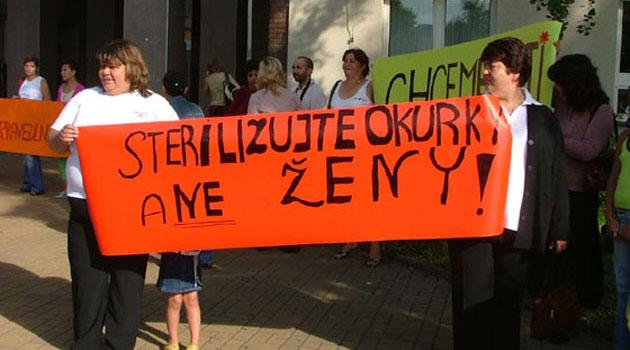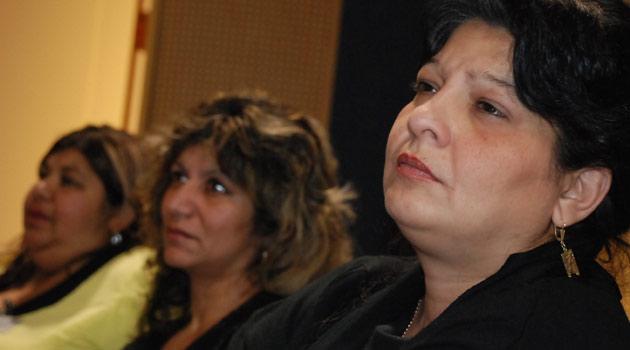Czech Govt tells UN that law to compensate forced sterilization will be ready in one year

The Czech Government is planning to submit a law to compensate the victims of illegal sterilizations by the end of 2015. It expects to have the outlines of the legislation ready by the end of this year.
The cabinet’s statement was part of its response to complaints from the UN Human Rights Committee, which oversees implementation of the International Covenant on Civil and Political Rights (ICCPR). Czech Government ministers are planning to discuss the text today.
The Committee criticizes the Czech Republic for discriminating against Romani people, for sending disproportionate numbers of Romani children to be educated as mentally disabled, for permitting the raising of pigs on the site of a former concentration camp at Lety by Písek, and for the use of cage beds in psychiatric treatment facilities. "The compensation law presumes there will be comprehensive compensation of the victims of illegal sterilizations and that their claims will be satisfied by the state. The victims will no longer have to bring civil lawsuits against the health care facilities where illegal sterilizations were performed," the Government writes in its response to the UN.
The Government adds that it is not responsible for the fact that victims have not brought their complaints before judges. Nevertheless, it wants to prepare the compensation law as a gesture of good will.
In 2004 the European Roma Rights Centre came forward with suspicions that women, primarily from the Romani community, were being forcibly sterilized in the Czech Republic. Dozens of women then contacted the ombud and some also turned to the courts.
The Czech Government’s Committee against Torture recommended paying compensation to the victims in 2006. In 2009 Czech Human Rights Minister Michael Kocáb and Czech Prime Minister Jan Fischer expressed regret for the illegal sterilizations.
The Czech Government Human Rights Council put forward its first motion to compensate the victims in 2007. The Council sent another such proposal at the start of 2012 to the cabinet of Prime Minister Petr Nečas (Civic Democrats – ODS).
Nečas did not review that motion before his government collapsed. According to estimates of the Czech Government’s Committee against Torture, as many as 1 000 women could be entitled to compensation.
At least 59 women are already known of who could definitely be compensated. That is the number of cases the Czech Supreme State Prosecutor previously received from the ombud for prosecution but shelved, claiming the evidence was insufficient for a criminal prosecution.
On the basis of a proposal made several years ago, the victims could receive between CZK 300 000 and CZK 400 000 each according to the degree of the harm caused to their health or the degree to which the applicable regulations were violated at the time of the surgery. Women who were involuntarily subjected to sterilization between January 1972 and May 1991 are just some of those who would be entitled to compensation.
Such surgeries were performed, according to regulations in place at the time, "in the interests of a healthy population," and the authorities motivated women to undergo them by offering benefits of up to CZK 10 000, a practice that ended in 1991. If the compensation law is adopted, then women who were illegally sterilized after 1991 would also be compensated who have been unable to seek redress in civil court due to the expiration of a three-year statute of limitations in their cases.
The UN Human Rights Committee has also recommended that the Czech state increase its efforts to, for example, remove the industrial pig farm from the site in Lety by Písek where a concentration camp for Romani people once stood during the time of the Nazi Protectorate. The Government has responded that it intends to collaborate with its Inter-ministerial Commission on Roma Community Affairs "to seek steps to resolve the situation and options for closing the operation of the industrial pig farm."
According to the UN Human Rights Committee, Romani people in the Czech Republic face discrimination, suffer from high unemployment and poor access to housing, and see their children end up in the "practical schools" (previously the "special schools"). Members of the Committee believe the state should solve these problems as well, and the Government points out in its response that it is preparing a new Romani Integration Strategy that will apply until the year 2020.
The UN Human Rights Committee has also criticized the low representation of women in management positions and politics in the Czech Republic. It has called on political parties and the state to take steps to ensure a higher proportion of women are involved in decision-making.
